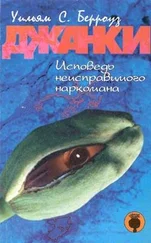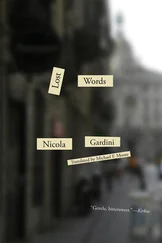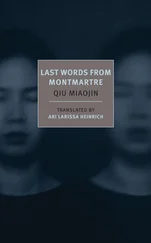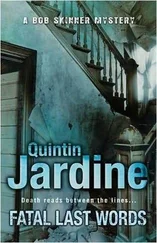Last Words
The Final Journals of William Burroughs
Edited and with an Introduction by James Grauerholz

Title Page
Introduction: His Education
Last Words
Notes for Last Words Aug. 31, 1999
Acknowledgments
About the Author
From the Reviews of Last Words
Other Books by William Burroughs
Copyright
About the Publisher
Introduction: His Education
At the end of his life William Burroughs was living in Lawrence, Kansas, in a modest two-bedroom cottage built in 1929 from a Sears & Roebuck house kit on Learnard Avenue, a quiet residential street in an old part of town. His front porch was obscured from the roadway by a profusion of honeysuckle, trumpet vine and redbud, white cedar and hackberry trees, and to the south a wide creek ran through branches and poison ivy to a 1930s-era concrete culvert bridge. The house was painted brick red with white trim, its roof a simple full gable front to back. The square pillars supporting his porch had tilted slightly outward over the years, giving the front aspect a warped perspective. A white trellis on the south side of the porch was covered with red rose blooms every summer.
On the porch by Burroughs’s front door there was almost always a cat sprawled out, sometimes two or three. A slab of soft marble lying by the door (an engraving sample from a funerary monument company) read BUR-ROSE. Behind the storm door the entry door was black, with a sticker on it to alert emergency authorities that there were cats inside to be saved. Through six beveled crystal panes in the upper door a distorted view of the interior showed a front room joining a dining area, with the tiny, brightly lit kitchen behind. A walnut buffet just inside the door was covered with an array of curios and talismans (a scorpion in Lucite, a curving kris, a jointed wooden snake); next to that, a cane stand was filled with a dozen walking sticks, clubs and canes with strange, carved handles. And an always-burning lamp on the small dining table might illuminate William Burroughs, hunched over in his four-wheeled “post-operative” chair, squinting at a paperback or scribbling in a bound journal book.
This is the view that greeted many an expectant visitor, for in the sixteen years after Burroughs moved to Lawrence at age sixty-seven he received countless pilgrims to his Midwestern Alamout—travelers from all over, mostly young people, seeking a brief personal contact with the author of Naked Lunch. His little house was the center of a continual round of social activity, with frequent visits by his many Lawrence friends and lively dinner company assured every evening. The daily shopping, cooking, and cleanup were handled by a rotating cast of regular companions, who often helped Burroughs host dinners for the many old friends who journeyed to Lawrence to spend time with him.
The most frequent visitors over the years were the poets John Giorno and Allen Ginsberg. After the “River City Reunion” in Lawrence in 1987—a weeklong gathering of poets and performers in William’s honor—Allen began to make annual visits, on his way to or from Naropa Institute’s summer writing program in Boulder, Colorado. When he was in Kansas Ginsberg stayed with Burroughs, the ex-lovers of years past now become two little old men sitting at the breakfast table in their bathrobes, arguing good-naturedly about nutrition and politics. Both were members of the American Academy of Arts and Letters, as well as the French Ordre des Arts et des Lettres, among other honors, but in William’s modest “home on the range,” far from the glare of celebrity, they renewed and continued a relationship that had begun during World War II.
In July 1996, at the age of eighty-two, Burroughs was honored with “Ports of Entry,” a visual overview of his career at the Los Angeles County Museum of Art, curated by Robert Sobieszek. Ginsberg was with him for the opening and other festivities, and when the retrospective moved to the Spencer Museum of Art at the University of Kansas in early November of that year, he came to Kansas to take part in a symposium at the Kansas Union. Ginsberg spoke lovingly of his old friend to a full house, and William climbed to the stage for an embrace that was roundly cheered. Two days later Allen left for New York. Although Allen had been ill with diabetes and heart trouble for some time, there was no obvious reason to expect that this would be their last farewell.
William’s health was still fairly good; it had been five years since his triple bypass operation, and while his energy reserves were clearly ebbing, his spirits were good. He was restless to be writing and keeping busy, and he said he was trying to reach a new synthesis of writing and painting, but without feeling that he had succeeded. Between diminished stamina and the arthritis in his hands, William had become unable to type more than a few lines. He often jotted down his thoughts—and, as always, his dreams—on index cards, but it was impossible to keep track of these or put them in any order. After our colleague Jim McCrary and I tried in vain to find a new typewriter that William could use, the idea arose to furnish him with bound blank books, in place of the index-card system.
It was in mid-November 1996 that Burroughs began to write the journals that are presented in this book. The first entry records the death of his cat, Calico Jane. In 260 days from November 14, 1996, to August 1, 1997, he made 168 entries. These writings include successive drafts of several short routines; remarks on books he was reading or had read long ago, and scenes suggested by them; lists of favorite lines from a lifetime of reading and listening; fits of impotent rage at man’s stupidity; day-to-day commentary; the heartbreak of the deaths of his beloved cats; and the contemplation of his own mortality. As late as these last nine months of his life, Burroughs was still compelled to do imaginary battle with his primordial foes: “Drug Warriors,” school-stupid FBI men, cat-haters, humans destroying the earth’s species in their arrogance: “When whales and seals and elephants weep, I cannot suppress the deadly Sin of Anger.”
The significance of William’s empathy with animals cannot be overstated. “My relationship with cats has saved me from a deadly and pervasive ignorance,” he wrote in notes for The Cat Inside, begun in 1982 at “the Stone House” south of Lawrence. As related in that short book, he was befriended soon after his arrival in Lawrence by three or four stray cats. When he moved into town to Learnard Avenue he brought along his favorite: Ruski, a Russian Blue. William had not always been a cat-lover, far from it; although he shuddered to remember it, he had several times been cruel to cats in Texas and Mexico. But now he thought often of the many people in his life who had died, and the cats seemed to represent them for him.
At his house on Learnard Avenue with its deep backyard garden, William took in a longhaired orange female stray whom he named Ginger. She mated with Ruski and produced “the orange litter,” which included Calico Jane. The all-black Fletch was a foundling in downtown Lawrence in 1984, and he quickly became William’s new favorite. Jane bore a litter to Fletch, and William gave the kittens to me and other friends. A male that William called Thomas appeared and disappeared in 1985–86, but another refugee, Mutie, a bulbous orange female tabby, stayed on after mating with Thomas. Her litter was distributed among friends, except for Senshu, the gray tabby female, who spent her life with William and her mother Mutie. After William brought Fletch into the house, the aging Ruski became undomesticable and he was farmed out to friends at a cabin on Lone Star Lake. It was around this time that William realized the folly of his prejudice against neutering his cats, and thereafter the only new addition to the cat family was Spooner, a longhaired gray-and-white male who was very affectionate.
Читать дальше













